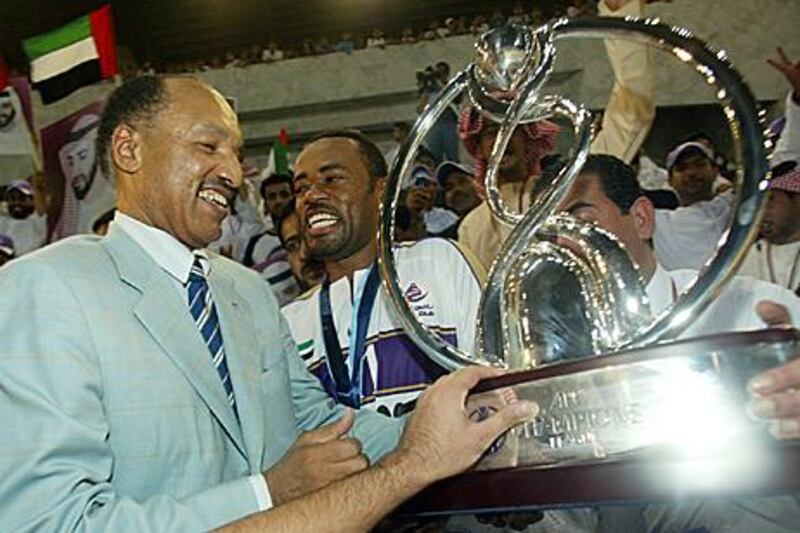The reputation of Mohamed bin Hammam took a hit yesterday when he was banned, until a full investigation can take place, from all football activities by the Fifa ethics committee.
That does not erase the accomplishments of the Qatari national as the president of the Asian Football Confederation (AFC), however.
When asked, not long ago, about his achievements in Asian football, bin Hammam replied: "I can humbly count a few, like revamping Asian football, encouraging professionalism, creating Vision Asia and democratising the AFC." While even his ardent supporters might have trouble finding evidence to support the last claim, the rest rings true.
Professionalism became the watchword when he took over in August 2002. That was just a month after Japan and South Korea showed that Asia's best could compete with any nation on and off the pitch at the World Cup. Bin Hammam wanted such levels of professionalism to become the norm and not the exception.
That task of establishing a consistent standard across a continent as huge and diverse as Asia has always been a huge challenge. The launches of professional leagues in places such as India, Qatar and the UAE were steps in the right direction.
One highly visible tool is the Asian Champions League that came into being in 2003 and has since become an important part of the Asian sporting calendar.
Prize money, sponsorship, publicity and prestige have all risen considerably over the years, though attendances are still erratic; getting Asian football fans interested in Asian football is not always easy. As well as the carrots of the millions of dollars now on offer for the winners, and a place at the Fifa Club World Cup, bin Hammam has used the tournament as a stick.
Only 10 nations, including the UAE, receive automatic spots in the Asian Champions League. Which nations are eligible and how many places they have comes not from points accrued from performances on the pitch, as in Europe, but through off-the-field criteria such as league attendances, marketing, relegation, administration and so on.
For those who miss out, there is the second-tier AFC Cup. There is also Vision Asia. That project was set up by the president when he took office and covers areas such as coaching education, marketing and administration in Bangladesh, China, India, Iran, Thailand and Vietnam.
"In Ho Chi Minh City, we have new clubs, newly qualified referees, coaches, football administrators and a league the city can be proud of and it is an example of what we are hoping we can bring to cities and communities all over Asia," said bin Hammam.
Bin Hammam has also developed close ties with European football and has encouraged a number of clubs to invest in grass-roots football on the world's biggest continent.
Asia has also become bigger in football terms. Bin Hammam was behind the move to get Australia into the AFC. Since the union in 2006, it has gone well, he said.
"It was a win-win situation for both Australia and the AFC," he said. "We now have a new country with good infrastructure, good technical and professional people and now they are enjoying a good competition in Asia. And, from a financial point of view, the clubs and the federation are having a chance to have better revenue."
Some federations are not as excited about the new member, but most are becoming used to the sight of the Aussies in action all over Asia.
Bin Hammam's relations with the continent, politically, have been less successful. It was his support that enabled Nurdin Halid to remain as Indonesia's federation chief despite two prison sentences. Only last month did Nurdin lose his grip after eight years in power.
In 2008, bin Hammam invited AFC nations to bid to host the organisation's headquarters. Kuala Lumpur, the federation's long-time home, refused to bid as demands from the body - reported to include interest-free loans, tax breaks and diplomatic status for top officials - were, in the words of the general secretary of the Football Association Malaysia, "too extreme".
Only the UAE and Qatar expressed interest. Most member nations were opposed to a move. In the face of growing disquiet, the plan was quietly dropped.
Tensions resurfaced in May 2009 as Asia was split again over the election for bin Hammam's seat on the Fifa executive committee. The incumbent said he would step down from his post as AFC president if he lost to Bahrain's Sheikh Salman, who was backed by Chung Mong-joon of South Korea, at the time a Fifa vice-president.
Bin Hammam won a bitterly contested election by two votes, but it came at a huge cost. Asian football felt broken, with concerns that it may have to split in two.
Carlo Nohra, chief executive of the Pro League, worked with bin Hamman at the AFC, and he recalled him saying: "I had a lot more friends before I became president and I have a lot more enemies since then."
It is testament to bin Hammam's powers of political recovery that Chung was enthusiastically backing him for the top Fifa job.
Bin Hammam's presidential push began on April 1, and he campaigned energetically, visiting every continent in search of support. On April 11 he was in Gambia; on April 28 he was in London; on May 1 he was in Asuncion, Paraguay; on May 15, he was in Egypt, a few days after what turned out to be a fateful visit to Trinidad & Tobago.
He has said he will step down as AFC president when his term is up in 2015.





